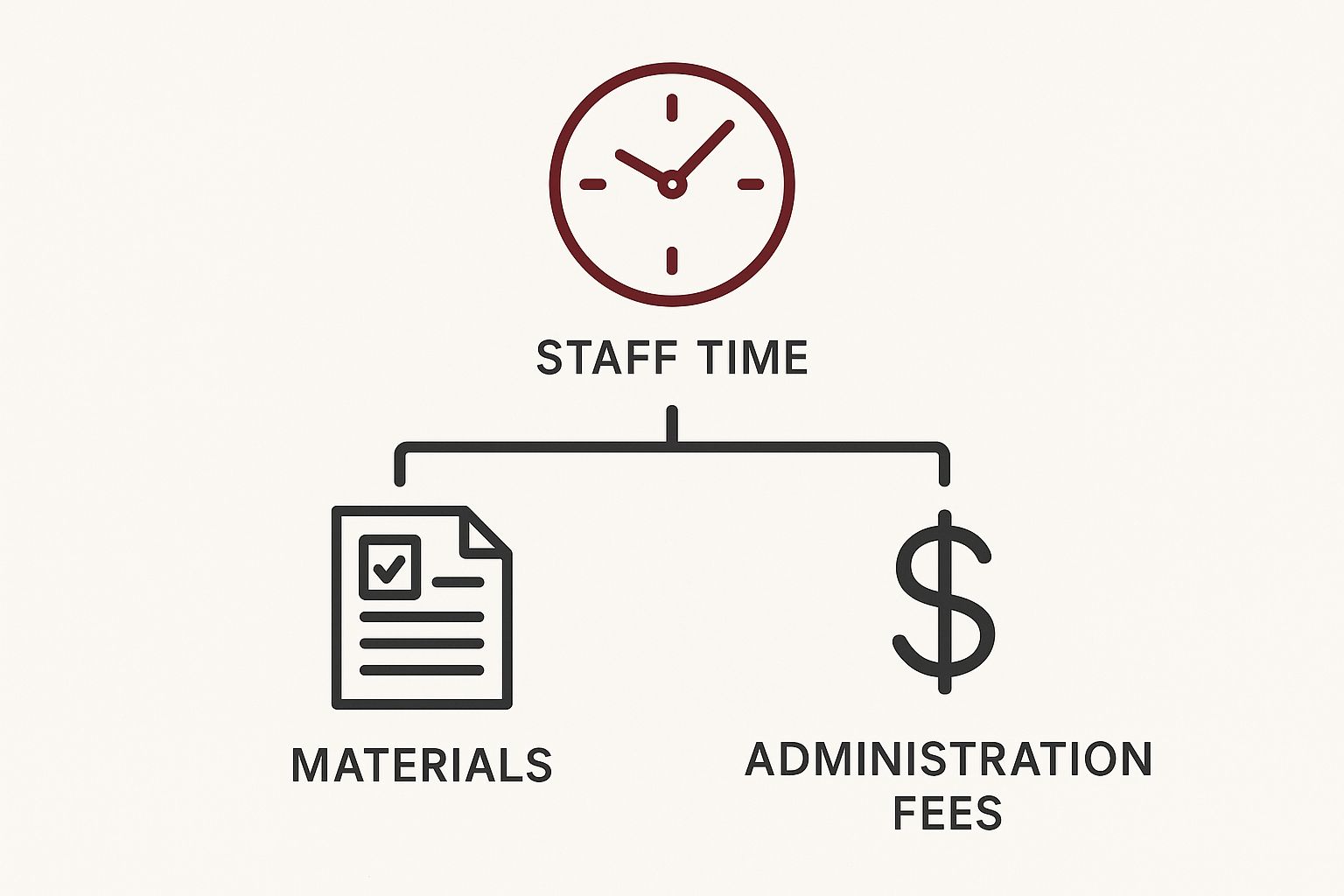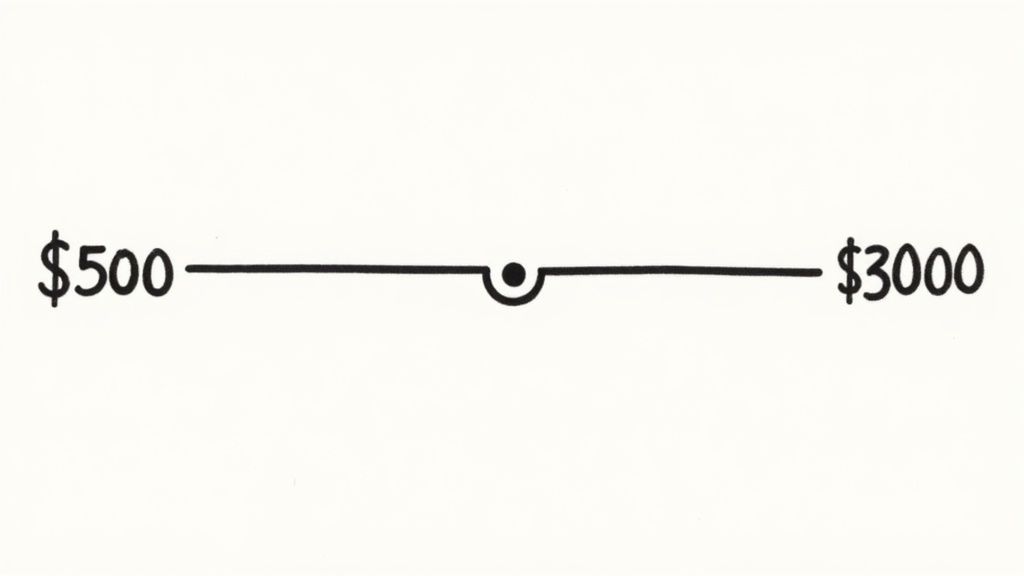When you first see the price tag for neuropsychological testing—typically ranging from $1,500 to over $6,000—it’s easy to feel a bit of sticker shock. But that number doesn't just cover a single appointment. Think of it less like paying for a quick check-up and more like commissioning a detailed architectural blueprint for your brain.
This isn't just about one test; it’s a comprehensive evaluation designed to map out how your brain works. The goal is to get a clear, data-driven picture of your cognitive strengths and weaknesses.
So, What Are You Actually Paying For?
A neuropsychological evaluation is a deep dive into your brain's operating system. It meticulously examines crucial functions like memory, attention, problem-solving, and executive skills. Just like a master mechanic runs a whole series of diagnostics to figure out what's going on under the hood of a car, a neuropsychologist uses a battery of standardized tests to build that complete picture of your cognitive health.
This in-depth approach is what makes the final report so valuable. It’s what leads to an accurate diagnosis and, more importantly, a truly effective plan for moving forward.
The Stages of an Evaluation
The total cost reflects several time-intensive, expert-led stages that happen both in and out of the testing room. Each step is critical to getting you the answers you need.
- The Initial Clinical Interview: It all starts here. This is an in-depth consultation where the neuropsychologist gets to know your history, understands your current struggles, and figures out exactly which tests will be most helpful.
- Test Administration: This is the part most people think of—the actual testing. It can take anywhere from a few hours to a full day, depending on the complexity of the questions we’re trying to answer.
- Scoring and Interpretation: This is where the real detective work begins. After you leave, the clinician spends a significant amount of time scoring each test and, more importantly, analyzing the patterns in the data to see what story they tell.
- The Comprehensive Report: All of those findings are then synthesized into a detailed, multi-page report. This document doesn't just give you a diagnosis; it explains what the results mean and provides personalized, actionable recommendations for school, work, or therapy.
A complete evaluation provides an invaluable road map. It offers clear, evidence-based answers that can guide everything from educational accommodations and therapeutic strategies to medical treatment for years to come.
Ultimately, the cost is a reflection of the hundreds of data points collected and the immense professional time and expertise it takes to turn those raw scores into a meaningful, life-changing plan.
To give you a clearer idea of how these costs break down, here is a quick overview of what you might expect for different levels of evaluation.
Quick Guide to Neuropsychological Testing Costs
This table provides an at-a-glance summary of the typical cost ranges you can expect for different levels of neuropsychological evaluation.
| Evaluation Tier | Common Use Case | Estimated Cost Range (USD) |
|---|---|---|
| Brief Screening | Initial assessment for a specific issue, like ADHD or memory concerns. | $1,500 – $2,500 |
| Standard Evaluation | Comprehensive assessment for learning disabilities, ADHD, or mood disorders. | $2,500 – $4,500 |
| Complex Evaluation | In-depth assessment for complex cases, like TBI, Autism, or co-occurring conditions. | $4,500 – $6,000+ |
Keep in mind that these are general estimates. The final cost will always depend on the specifics of your situation and the depth of the evaluation required to get you the answers you need.
What Really Drives the Price of an Evaluation
When you see the price tag for a neuropsychological evaluation, it's easy to wonder why it costs what it does. The biggest factor, by far, is professional time. Think of it less like buying a product off a shelf and more like commissioning a custom piece of work, like hiring an architect to design a house just for you.
The more complex your needs, the more time the project requires. A straightforward ADHD evaluation, for example, might only involve a few hours of testing and analysis. But a deep dive into a suspected brain injury or a complex diagnostic picture demands a much more extensive battery of tests, which means significantly more hours for administration, scoring, and careful interpretation.
This image breaks down where the costs typically go.
As you can see, the lion's share of the cost is directly tied to the clinician's time, with smaller portions covering materials and administrative overhead.
Core Pricing Factors
Several key variables will influence the final number on your invoice. Understanding them can help demystify the quote you receive and explain why one evaluation might cost more than another.
To make this clearer, let's look at the primary components that contribute to the total cost of an evaluation.
Breakdown of Factors Affecting Testing Costs
| Cost Factor | Description | Typical Impact on Price |
|---|---|---|
| Clinician's Expertise | A neuropsychologist with decades of specialized experience will naturally have higher rates than someone early in their career. You're paying for their depth of knowledge and ability to interpret complex results. | High |
| Geographic Location | Just like many professional services, costs vary by region. Fees are often higher in major cities where the cost of running a practice is greater. | Medium to High |
| Scope of Evaluation | The number and type of tests depend on the questions you need answered. Unraveling co-occurring conditions requires a broader, more intensive assessment. | High |
| Report Writing & Analysis | The time spent "behind the scenes" scoring tests, analyzing data, and writing the detailed, personalized report is the most significant part of the process. | Very High |
| Administrative Costs | This includes the overhead for running the practice, such as rent, utilities, and support staff, as well as the cost of testing materials and software. | Low to Medium |
These factors work together to determine the final price, ensuring it accurately reflects the expert time and resources required.
The most significant cost driver is often the "invisible" work. For every hour of face-to-face testing, a clinician might spend 3-4 hours scoring, analyzing, researching, and writing the comprehensive report that gives you the answers you're looking for.
For instance, the scope of a complex evaluation can involve 15 to 25 hours of intensive professional time. In a major city like Los Angeles, this can result in costs ranging from $3,000 to over $6,000. The complexity of the referral question also plays a huge role; you can read our guide on the cost of an autism diagnosis to see how this applies to specific conditions.
Ultimately, the cost of neuropsychological testing isn't arbitrary. It’s a direct reflection of the expert time and resources needed to create a clear, actionable roadmap for your cognitive health.
Navigating Insurance for Your Neuropsychological Test
Getting your insurance to cover a neuropsychological evaluation can be a game-changer for the final cost, but it isn’t automatic. It’s a process that requires you to be proactive. Taking the time to understand your plan and get your ducks in a row before your first appointment will make all the difference in what you end up paying.
Your first move is to figure out if your neuropsychologist is in-network or out-of-network. An in-network provider has a pre-existing contract with your insurance company, which almost always means lower costs and less paperwork for you. Going out-of-network usually translates to higher out-of-pocket expenses and a more hands-on claims process.
The Importance of Pre-Authorization
Before you go any further, you absolutely must get pre-authorization (sometimes called prior authorization) from your insurance company. Think of it as getting a green light from your insurer before they'll even consider paying the bill. If you skip this step, your claim will almost certainly be denied, leaving you on the hook for the entire cost.
To get that green light, your referring doctor has to prove medical necessity. This means they need to provide solid evidence that the testing is essential for diagnosing or treating a specific medical condition. For instance, they might document cognitive shifts after a traumatic brain injury or explain why the evaluation is critical for developing an effective ADHD treatment plan.
One of the most common reasons for a denied claim is a failure to properly demonstrate medical necessity. Your doctor's detailed referral is your most powerful tool here—it needs to clearly state why the test is essential and not just for academic or work-related reasons.
Questions to Ask Your Insurance Provider
The best way to avoid surprises is to call your insurance company directly. Arming yourself with the right information will help you understand exactly what you're dealing with.
Here’s what to ask:
- Does my plan cover neuropsychological testing? (Mentioning CPT codes 96132 and 96133 can help them find it faster.)
- Is pre-authorization required for this service?
- What is my cost-sharing for in-network versus out-of-network providers?
- Have I met my annual deductible yet?
- What is my out-of-pocket maximum for the year?
And if your claim gets denied? Don't just accept it. You have the right to appeal. This usually involves gathering more detailed documentation from your doctors to build a stronger case for why the testing is medically necessary. A little persistence can go a long way.
How Testing Costs Vary Around the World
The price tag on neuropsychological testing isn't just a local issue; it’s a direct reflection of a country's economic health and healthcare system. While an evaluation in a major US city might feel expensive, just having access to this kind of service is a major hurdle in many parts of the world. The reality is that both the cost and the availability of testing can change dramatically from one nation to another.
Nowhere is this difference more obvious than in low- and middle-income countries (LMICs). In these regions, healthcare budgets are stretched incredibly thin, and national income is much lower. Economic constraints mean the focus is often on more immediate public health crises, leaving specialized services like neuropsychological testing underfunded and largely inaccessible.
To get around this, many researchers are pushing for shorter, more affordable cognitive screening tools that are practical for these settings. It's a complex issue with no easy answers.
The Impact of Cultural and Normative Data
Another huge factor is where the tests themselves come from. The vast majority of standardized neuropsychological tests were created and normed using Western, educated, and industrialized populations. This creates a massive problem when you try to apply them in a completely different cultural context.
A test that accurately measures attention in one culture might be totally invalid in another because of language differences or different educational backgrounds. Adapting these tests for global use is a costly, time-consuming process.
This need for cultural translation adds another layer of expense and complexity, directly impacting the cost of neuropsychological testing worldwide.
While practices offering neuropsychological testing in NYC are well-established, building that same infrastructure elsewhere requires a huge investment. It takes time and money for research, training, and resources to make sure the results are not only accurate but actually meaningful for the people being tested.
Finding More Affordable Neuropsychological Testing
If the high cost of neuropsychological testing feels like a barrier, don’t give up. There are several practical ways to make these essential services more affordable. You just have to know where to look.
One of the best-kept secrets is your local university training clinic. These clinics often provide evaluations at a steeply discounted rate. Why? The testing is done by doctoral students who are closely supervised by licensed clinical neuropsychologists. You get a thorough, expert-reviewed assessment for a fraction of the usual price.
Exploring More Avenues for Lower Costs
Beyond university clinics, other options can significantly ease the financial burden. The key is to be proactive and ask providers directly about what financial assistance they offer.
Here are a few key strategies to look into:
- Sliding Scale Fees: Many private practices and community health centers use a sliding scale fee structure. This simply means your cost is adjusted based on your household income, making the final bill much more manageable.
- Hospital and Community Programs: Check with nearby hospitals or non-profit organizations. They sometimes have grants or community outreach programs that help pay for psychological and neuropsychological evaluations for people in the area.
- Research Studies: Keep an eye out for research studies at universities and medical centers. They frequently need participants and, in many cases, will offer a comprehensive neuropsychological evaluation for free as part of the study.
Taking the time to research these options can uncover affordable and sometimes even free opportunities for testing. These programs exist to make sure everyone can get critical diagnostic services, regardless of their financial situation.
By exploring these different avenues, you can find a path to the answers you need without letting the cost of neuropsychological testing stand in your way.
Frequently Asked Questions About Testing Costs
It’s completely normal to have questions about the financial side of neuropsychological evaluations. Let's walk through some of the most common ones that come up.
Why Is Neuropsychological Testing So Expensive?
The high cost of neuropsychological testing can be surprising at first glance, but it’s a direct reflection of the immense professional time involved.
For every single hour of face-to-face testing, our clinicians often spend several more hours behind the scenes. This includes meticulously scoring results, analyzing complex data patterns, and writing a comprehensive, personalized report that truly captures the whole picture. It’s this intensive, expert analysis that makes the evaluation so valuable.
Do I Always Need a Referral from a Doctor?
While you don't always need a doctor's referral to book an evaluation with us, it’s almost always a requirement if you plan to use your health insurance.
A referral is what establishes medical necessity—the key phrase insurers look for to approve coverage. Without that official referral, you’ll likely be responsible for the full cost out-of-pocket.
How Does the Cost Differ for Children vs Adults?
Testing costs can sometimes be higher for children, and there’s a good reason for it. A child’s evaluation is often more comprehensive.
We frequently need to include academic assessments and interviews with parents and teachers to get a complete, 360-degree view of what’s going on. The final report for a child also tends to be more detailed to help guide school-based support, like setting up an Individualized Education Program (IEP).
If you have more questions, feel free to explore our detailed neuropsychological testing FAQ page.
At Sachs Center, our expertise lies in providing clear, accurate diagnostic evaluations for ADHD and Autism. Our team offers telehealth testing right in the comfort of your own home, making the whole process less stressful. If you're ready to get the answers you’ve been looking for, book your evaluation today at https://sachscenter.com.


